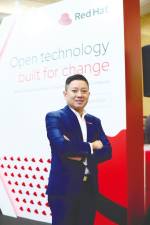
How has your life experience made you the leader you are today?
I am an Ipoh boy at heart and, in many ways, that hasn’t changed. I was lucky enough to study in the States which gave me an international perspective... which I brought with me when I came back to Malaysia and started my career right in the middle of the dotcom boom.
I’ve been a tech advocate throughout my career. The pace of our industry, particularly in cloud computing, certainly keeps me on my toes. In my current role, I’m excited about taking Red Hat Malaysia to its next phase of growth and supporting the country’s broader move to a digital economy through the clients we serve – many of whom provide essential services to the citizens.
What traits do you look for in your talent or how do you decide who is right for a job?
Red Hat is first and foremost a tech company, so, of course, the skills for the job are important. For developers, we are always looking for people who write great code. Given the dynamism of the open source community in Malaysia, there’s a deep wellspring of talent to draw from. Many of Red Hat’s global developer talent has gone “from dorm room to boardroom”, so to speak. Just take a look at our global CEO Paul Cormier.
But all around, we are looking for hires who understand what it means to be transparent, collaborative, and accountable. Because that is the foundation of Red Hat as an open source company. So technical skills are important, but we are looking for people who understand and buy into the vision of what we are doing, which is creating enterprise tech that is changing the world.
How do you think the industry you are in will evolve in the future?
That depends how technical you want me to get. At the tech level, currently spending a lot of time thinking about Quarkus – which is the next evolution of the coding language Java – and the impact this will have on cloud computing at large. Given how fast Malaysia and Southeast Asia are leapfrogging technology, I’m also thinking about edge computing, particularly with telcos.
Often I am looking at my kids and how digital-native they are, and the demands that will put on businesses (my own clients included) to deliver seamless services. All of that is related to cloud-based infrastructure.
In the bigger picture, more enterprises are turning to open source solutions to modernise their IT systems. The question is no longer “why cloud computing”, but “how? when? And what is that mix”?
Businesses will not be competing for who adopts open source the soonest, but who has the most innovative and efficient applications to drive digital transformation. We are seeing this with clients like Alliance Bank who moved their branches to a “phygital” model. This is not industry-leading only in Malaysia, but innovative at a global level.
What advice can you offer those looking to start their career/own business?
Read widely. We live in the information age and there’s a wealth of knowledge at your fingertips. If you’re looking to brush up your Linux skills or learn more about automation, Red Hat has free online courses that you might want to take advantage of.
We all know about the industrial revolution, are we in for a technological revolution? Your thoughts.
We’re already in it, since we’re talking about Industrial Revolution 4.0 and the digital economy. Some of the digital transformation projects we are working with clients on include preparation for 5G architecture in the telco sector, and transformation within the financial services industry to introduce digital products and services through open banking. Another example where we’re helping clients pivot is with open innovation labs, which is focused on digital transformation and building a strong DevOps culture.
How has mentorship made a difference in your professional life?
Great leadership makes all the difference and it pushes me to pass this on to the next generation of leaders as well. As I was growing in my career, my managers taught me that people are our greatest assets when it comes to running a successful organisation. In a sales role you are often asked to go above and beyond to win and serve clients, so it’s important for me to pay that forward for my team, and ensure they remain inspired.
What do you want to accomplish in the next five years?
Keep Red Hat’s business growing at a healthy and sustainable rate. We are ambitious about the potential in Malaysia for the next few years especially when it comes to hybrid cloud, containerisation, and automation. Red Hat is honoured to have the trust of many organisations from different industries such as financial services, telco, government, retail, and manufacturing. We hope to expand our market leadership.
As you can see, technology advances quickly and will continue to evolve in the future. On a personal level, I’ve been encouraging my children to remain prepared for the digital world by sending them to coding class. It’s pretty interesting, as they’re learning Python and mobile development at the moment. A great change of perspective from my day-to-day job.
Best piece of advice you ever received on your career.
To quote Sun Tzu: ”To know your enemy, you must become your enemy”. Or my interpretation of it: know yourself, but know your competitor better. Understand what your competitors are doing well, and strive to go one step further.
Most-admired business leader? Why?
Jim Whitehurst, the ex-CEO of Red Hat and currently president of IBM. Jim grew Red Hat to become the first US$1 billion revenue open source software company in 2012 and tripled Red Hat’s revenue from US$500 million in 2008 to US$3.4 billion by 2019. The story of how he turned around Delta Airlines in his previous role is also inspirational to me.
How do you stay abreast of issues affecting your industry?
Talk to your community. The value of taking time to grab a coffee with those in your network cannot be underestimated. I’ve found out a lot of great intel and trends this way.
If you could have an hour with any thought leader in the world, who would it be and why?
Elon Musk. He’s a visionary and truly believes in every business venture he puts his mind to. Because he has such tenacity, he isn’t afraid to face obstacles others might find impossible to overcome. For example, he risked his entire early fortune to build SpaceX and Tesla. His companies are focused on addressing three distinct existential risks to the long-term survival of humanity: climate risk, single-planet dependency risk, and human species obsolescence risk. It would be great to understand how he thinks and approaches the world.
What has been the biggest challenge you have faced? And what did you learn from it?
I always like to look at challenges as growth opportunities. If I had to share a recent instance, it would be when I joined Red Hat as country manager of Malaysia. As I assessed the business opportunity we had, and compared it to the team’s skill sets, I realised we needed to make some changes. We had to re-engineer the team for stronger long-term performance, and often this is only possible if you take time to understand your team well and not just outline decisions and enforce them. A leader needs to walk the talk and build trust in the team to make any change happen. And restructuring is never easy, but we had to do it keeping in mind business and organisational needs.
We evaluated each team member’s strengths and weaknesses, and in some cases had frank conversations with them to place them where they’d be better able to contribute and advance in their career. This was better for the team in the long run, and our alumni have gone on to do great things, whether it is inside Red Hat or elsewhere.
This decision also gave me an opportunity to understand my team better and make them integral to our company’s growth story in Malaysia. Red Hat’s open organisation and open culture give the manager and associate opportunities to reflect and share feedback. I also learned that we have to stay objective in order for change to happen. Sometimes, as leaders, we need to make tough decisions but it is important to find a balance and think long term.
What was the most outlandish business proposal you have ever heard of?
I believe there are no ideas or proposals that are too outlandish. Every great innovation or idea we read about is always mocked in the first instance. And so, it is just a matter of perspective.
What man-made innovation confounds you? Why?
I wouldn’t say one that confounds, but one that often amazes me is how smartphones have revolutionised our lives. Besides calling, texting and emailing, more than two billion people around the world now use these devices to navigate, run essential banking services, book cab rides, follow news, find entertainment, and of course... to stay connected. Can you imagine yourself without your smartphone for a day?
This is impacting our clients too because their customers – like me or you – want fast, efficient, and reliable mobile services. And then I feel proud that I am working for a company that is helping realise some of these innovations through services like cloud computing and open source technologies.
Malaysia’s greatest brand.
Old Town Coffee. For the number of late nights and business deals that they’ve seen me through.
A must-read for every business owner/manager is...
The Open Source Way by Jim Whitehurst. Jim wrote this before he moved from Red Hat across to his role as president at IBM. The book is a good dive into how adopting open source principles can alter the nature of work, management, and leadership. It also discusses how open source principles can form the foundation of tomorrow’s most innovative organisations.
But what also struck me was the humility of Jim. He is a modest and compassionate leader. The book enumerates this well where he has candidly written about his experience of working in an open organisation, where associates would directly reach out to him to share any good/bad feedback for a project. And often it would also be about a program he has implemented. The book is a great reminder of the power of teamwork and that we are the sum of all our parts.
What are the top three factors you would attribute your success to?
Hard work. My family. Strong email filters.
Tell us a joke.
A user interface is like a joke. If you have to explain it, it’s probably not very good.
Source: The Sun Daily

No comments:
Post a Comment